When writing a resume, a part that is often overlooked is the "Hobbies" block, and this is where you can shine.
Having a hobbies section on your resume can be a good strategy in some cases as it can help you stand out from other candidates. But you need to make sure that your interests are related to the job, and that they help you impress the employer.
In this guide, we'll take a closer look at the process of creating a compelling list of hobbies for resume, discussing the things that you need to and need not to do. We'll also show you how to walk the fine line between the personal and the professional.
According to the U.S. Bureau of Labor Statistics' nearly all Americans aged 15 and over (96%) engaged in some form of leisure and sports activity daily. On average, individuals spent about 5.2 hours per day on these interests.
Resume samples with a hobbies list:
Laurene R. King
Phone: (123) 456-7890 | Email: laurene.king@email.com
LinkedIn: /laureneking | Address: Eugene, OR 97401Objective
Creative and analytical marketing professional with experience in content creation, brand strategy, and digital marketing. Eager to apply expertise in social media management, data analysis, and cross-functional collaboration to contribute to a dynamic team and drive brand success.
Professional Experience
Senior Marketing Strategist
Innovative Marketing Solutions, Eugene, OR
August 2021 – Present
- Spearhead brand repositioning efforts, leading to a 40% increase in customer engagement across digital platforms.
- Manage content creation for multiple social media channels, increasing follower engagement by 60%.
- Collaborate with sales teams to create tailored marketing materials, boosting sales by 25% in Q3.
- Conduct in-depth market research to identify emerging trends and inform quarterly strategy updates.
Marketing Specialist
Creative Insights Agency, Eugene, OR
May 2017 – July 2021
- Developed SEO-driven content strategies that resulted in a 50% increase in organic website traffic.
- Produced and edited video content for marketing campaigns, contributing to a 20% growth in social media reach.
- Managed email marketing campaigns, improving open rates by 15% through segmentation and A/B testing.
- Tracked and analyzed performance metrics to refine content strategy and drive higher ROI on marketing efforts.
Education
Bachelor of Arts in Marketing
University of Oregon, Eugene, OR
Graduated: May 2017
- GPA: 3.9/4.0
- Relevant Coursework: Digital Advertising, Consumer Psychology, Market Research, Brand Strategy
Skills
- Social Media Marketing (Facebook, Instagram, LinkedIn, Twitter, TikTok)
- Content Development & Copywriting
- Search Engine Optimization (SEO)
- Data Analysis & Reporting (Google Analytics, Excel)
- Adobe Creative Suite (Photoshop, Premiere Pro)
- Campaign Management & Strategy
Hobbies
- Traveling: Passionate about exploring new countries and cultures, with a focus on food and photography.
- Photography: Enjoy taking landscape and portrait photos as a way to capture moments and tell stories.
- Yoga: Practicing mindfulness and physical wellness through yoga and meditation.
- Reading: Enthusiastic about fiction and non-fiction books on personal development and business strategies.
- Cooking: Experimenting with healthy recipes and hosting dinner parties for friends and family.
Resume template with a hobbies list:
What's the difference between hobbies and interests?
I don’t have hobbies; hobbies cost money. Interests are quite free.
While the terms "hobbies" and "interests" are often used interchangeably, there is a subtle distinction when it comes to including them into the application papers and making a resume.
| Hobbies | Interests | |
|---|---|---|
| Definition | Hobbies are activities that you engage in for pleasure and relaxation in your leisure time. | Interests encompass a broader spectrum of topics, encompassing things you find intriguing or captivating. This can include interests related to your field of work or broader intellectual pursuits. |
| Relevance to resume | Listing hobbies on your resume can offer insights into your personality, and values you may have developed through these activities. | Interests list can demonstrate your enthusiasm for your industry and showcase your commitment to staying informed about relevant developments. |
| Tone | Suggests a balanced lifestyle and the ability to unwind or de-stress in healthy ways. | Implies curiosity, initiative, and a desire to stay intellectually or professionally engaged. |
| Examples | Playing a musical instrument, painting, hiking, cooking, or doing sports. | Following industry trends, attending conferences, or participating in online forums. |
Types of hobbies to put on a resume
Listing hobbies and interests on your resume is an excellent way to make it unique among the rest. It can give potential employers a better sense of who you are, thus demonstrating your passion for something. Yet, which recreations should you list?
There is no one-size-fits-all answer, as it depends on the job you're applying for. When choosing what hobbies to put on a resume, ensure that you select ones that correspond with the role.
15 most popular hobbies and interests
"Cooking / Baking" and "Reading" are among the top two responses from U.S. consumers in our "Most Popular Hobbies & Interests" survey. (Statista (1))
1. Culinary
Whether it's cooking, baking, or trying new dishes, investigating the world of ingredients can be an enjoyable way to spend your time.
Beyond the initial listing of culinary interests on your resume, consider going deeper into specific aspects that can make your gastronomic passion even more appealing to potential employers.
Foster your enthusiasm for appreciating diverse cuisines and exploring bartenders' latest mixology techniques. If you're a member of a gourmet or culinary club, highlight your involvement on your resume's list of hobbies. If your love for food extends to studying nutrition, bring that up as well.
In 2024, the U.S. Bureau of Labor Statistics reported that 57.2% of Americans aged 15 and older engaged in food and drink preparation daily, averaging 53 minutes per day.
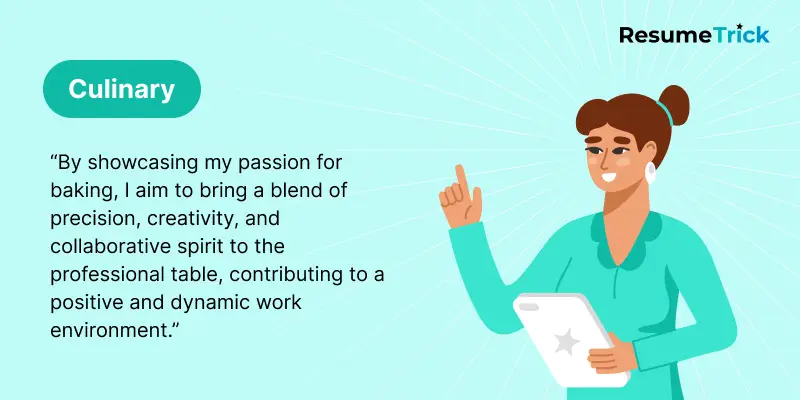
2. Reading
Regular reading enhances vocabulary, broadens horizons, develops critical thinking. These attributes are valuable in roles that involve written or verbal communication, such as content creation, marketing, or client relations.
Reading is not merely a pastime; it's a gateway to continuous learning and intellectual enrichment. By putting it on your list of hobbies, you signal to employers that you are someone committed to expanding your knowledge base, a trait highly valued in any professional setting.

3. Traveling
Traveling often involves regulation of diverse situations, adapting to new environments, and handling unexpected challenges. Mentioning it on hobbies list suggests adaptability and flexibility, qualities many employers appreciate.
You can also network with other travelers by joining travel-related groups or forums. These connections are invaluable for making contacts in the job market. Members may share job postings, recommendations, or firsthand experiences.
Plus, if you document your travels on social media, it will not only denote your interest in travel but also showcase your communication skills.
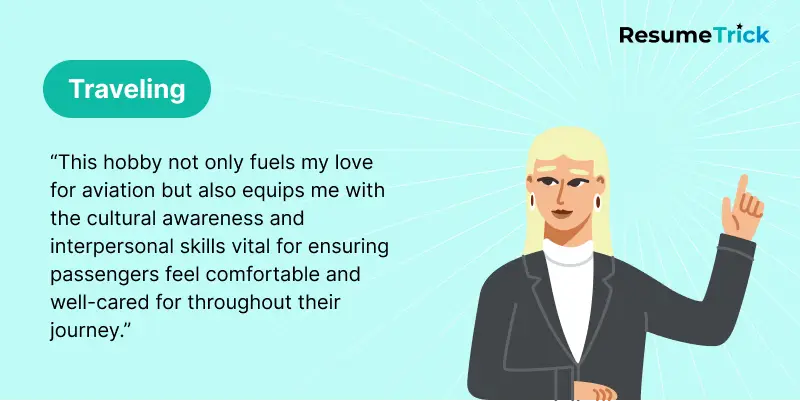
4. Community involvement
Joining local initiatives is a rewarding activity to record on your resume the hobbies list. This showcases your collaborative spirit, leadership potential, and ambition to shape the world.
When highlighting community involvement on your resume, consider the following aspects:
- Volunteer work. Contributing to local charities, organizations, and events are superb resume activities. You can mention setting up fundraise for causes or even mentoring someone in need.
- Leadership roles. If you've held leading positions within community organizations, clubs, or events, showcase these experiences.
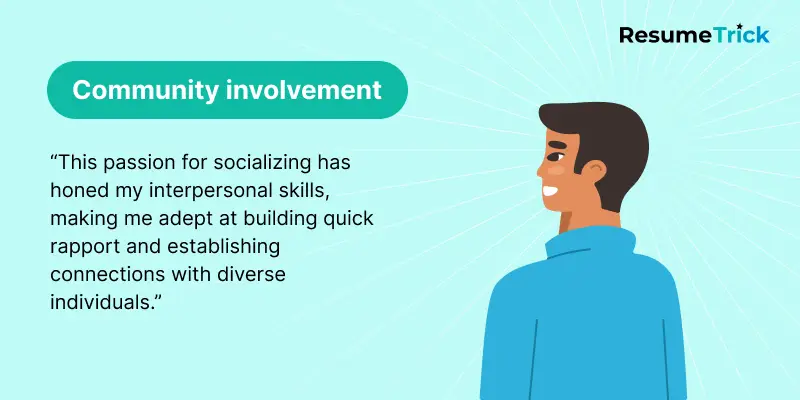
Being an active member of the community doesn't just mean joining clubs or volunteering. Attending town hall meetings or supporting local businesses by helping them create a social media account show you collaboration skills and empathy.
5. Sports
Showcasing a healthy competitive spirit in a list of hobbies and interests on a resume can be advantageous.
Participation in sports highlights your capacity to thrive in various situations while maintaining sportsmanship.
Sports range from team ones like soccer and basketball to individual activities such as running and swimming. You might even include hobbies examples like yoga or martial arts if they give an idea of certain skills or qualities.
Fitness is a hobby that 25% of Americans pursue, according to Statista (1).
If you have experience playing on a team, show that in your resume. Underline your leadership abilities or tell how you worked together to achieve success.
If you're an individual athlete, list any competitions or achievements you've accomplished. Talk about how you enlarged your skillset and overcame challenges to reach your goals.

6. Art
Art, whether through painting, drawing, visiting museums, or other mediums, serves as a tangible expression of creativity.
By highlighting such interests on your resume, you convey an ability to think innovatively and approach challenges with a creative mindset.
If you are proficient in digital art tools such as Adobe Illustrator or Photoshop, list those on your resume's list of hobbies. This could boost your chances of getting an interview for a job that requires such skills.

7. Gardening
Gardening requires a keen eye for detail, from selecting the right plants to nurturing them to bloom.
By listing this hobby on resume, you subtly communicate your attention to detail and patience.
You can specify the types of gardening activities you engage in to provide a more detailed and nuanced picture of your skills and interests. For example, permaculture highlights your knowledge of sustainable and regenerative farming practices.

8. Photography
Photography is one of the most fun and creative hobbies to put on a resume.
Modern photography often entails the use of advanced camera equipment and editing software. Listing photography as a hobby can imply a level of tech-savviness that might be relevant in today's digitally-driven workplaces. This might be an attractive addition to your resume and an interesting topic of conversation during interviews.
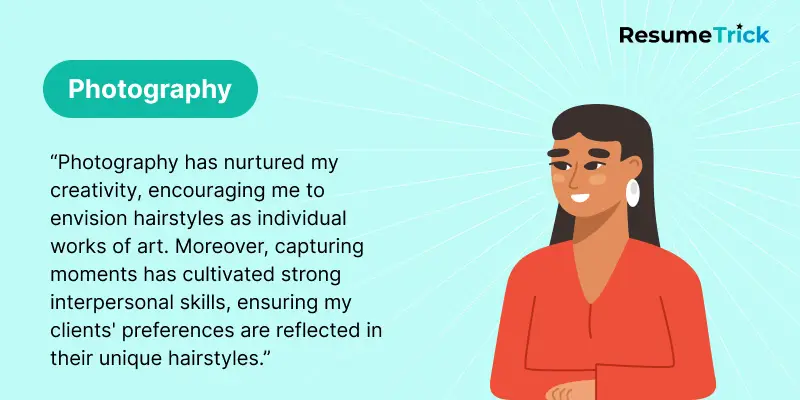
9. Technology
Sometimes when you turn a hobby into a job, it becomes work.
Technology-related activities are among the most important interests to put on a resume. They show that you understand the latest AI achievements, and can apply them to solve problems.
Participation in tech meetups, conferences, or online forums demonstrates your interest in staying updated on industry trends. If you enjoy gaming or have experience in creating simulations, mention it. This can illustrate your understanding of immersive technologies and user experience.

10. Writing
It is worth to display any writing experience in the list of hobbies on a resume, as well as any awards or recognition you have received for your work.
Writing is a powerful way to showcase your ability to communicate effectively. It implies proficiency in conveying ideas, organizing thoughts, and presenting information in a coherent manner.
You can list any writing-related hobbies on your resume. These could include activities such as: penning short stories, writing plays or poetry, and keeping a journal.

11. Music
Music, with its diverse genres and expressive forms, is a powerful outlet for creativity. By showcasing your love for music, you convey a unique essence that can be attractive to employers seeking individuals with innovative and imaginative qualities.
Music is a hobby enjoyed by 22% of Americans (1).
Mastering an instrument, participating in a choir, or even curating playlists requires discipline and dedication.
Listing music as a hobby on a resume subtly communicates your skill to commit to long-term endeavors and persistently pursue goals.

12. Blogging
In the digital age, online presence matters. Mentioning blogging in your hobbies list indicates your familiarity with online platforms, content management systems, and social media.
Blogging involves not just writing but also content creation, marketing, and audience engagement. This multifaceted approach can underline your proficiency in various aspects of content strategy and digital marketing.

13. Languages
Learning languages showcases your dedication to advancing your communication skills and expanding your knowledge. Plus, knowing rare or difficult languages looks impressive on a list of hobbies and interests!
Companies with a global presence often seek employees who can seamlessly work across language barriers. Your language skills make you a valuable asset for international job transfers, as you can contribute to the organization's success in various regions.
You don't need to become fluent in a language to include it on your resume's list of hobbies. Even if you've just taken a few classes or learned some basics through self-study, it's still worth declaring!
It proves that you're willing to go the extra mile and gain knowledge in an area outside of your comfort zone.

14. Dancing
Dance often entails collaboration with others, whether it's a partner or a group. Including dance communicates your proficiency in working harmoniously within a team.
This is one of the activities for a resume that intersects with various creative industries, including music, fashion, and visual arts. If your hobby involves collaboration with professionals from these sectors, it expands your skillset and indicates your ability to work in interdisciplinary environments.

15. Collecting
Do you have a knack for finding rare items? If so, consider adding collecting to your list of hobbies. It's an impressive technique for displaying to HR your discernment, imagination, and inquisitive nature.
Mention your organizational skills in maintaining and cataloging your collection. This showcases your ability to manage information systematically, a skill applicable in roles that demand order and structure, like a team lead position.

Ambiguous hobbies examples
It's important to accurately represent your hobbies for resume, but some can be overkill and even hurt your chances of getting hired.
Avoid including the following activities (if they are not connected with your primary duties):
- Video games. While they demonstrate dexterity unless you're looking for a job in the gaming industry, it would be wise to leave this hobby off your resume.
- Socializing. Too much talk about going out with friends and having fun can make it seem like you don't take your job search seriously.
- Politics. It is advisable to abstain from discussing politics on a resume, as it potentially turns off the hiring manager or distracts them from focusing on your qualifications.
- Religion. Even if you are very religious, it's best to keep this information off, as it leads to potential discrimination.
- Extreme adventures. While these activities might make you look cool, they don't necessarily help you land the job and could be seen as a distraction from what matters most: your skills and experience.
- Watching TV shows. Passive entertainment rarely highlights valuable traits unless you're applying for a media-related position.
How to list hobbies on a resume?
When listing hobbies on your resume, it's important to do so strategically to showcase relevant qualities. Follow these tips to effectively incorporate hobbies into your resume:
- Relevance to the job. Choose hobbies that demonstrate skills or qualities that are important.
- Highlight skills. Identify the hard and soft skills your hobbies helped you develop.
- Strategic placement. Place your interests wisely, typically in a dedicated "Hobbies" or "Interests" section near the end of your resume.
- Use action verbs. Start each hobby description with action verbs to make them more engaging.
- Keep it concise. Be brief in your descriptions. This resume section should complement your professional experience, not overshadow it.
Resume Trick simplifies the process of creating a professional and visually appealing application. It allows to add various resume sections including a list of your hobbies.
Follow these steps to effectively showcase your personal interests:
- Open the builder in your preferred browser and select the best resume template that suits your style.
- Once you're done filling the main information, scroll down to "Add section" and click "Hobbies".
- You can select one of the standard options or type in your hobbies list manually.
- Once you're satisfied with the document, download the final version in PDF format.
- Double-check the spelling and tone of your entries to ensure they align with the rest of your paper.
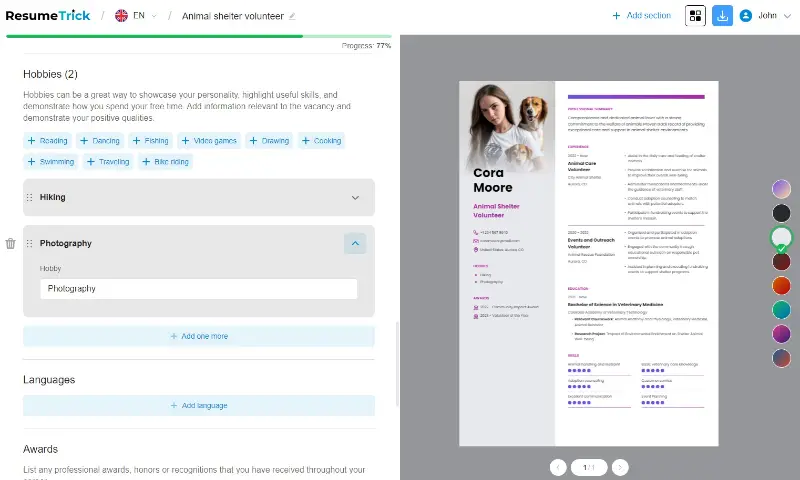
Create your professional Resume in 10 minutes for FREE
Build My Resume
Examples of hobbies for most popular jobs
Marketing resume activities
Marketing is all about creativity, and potential employers want to know that you have interests outside of the office.
Professionals in this industry often list hobbies on resume like these:
- Digital design: Improves your graphic communication skills.
- Networking: Makes new connections and expands your professional network.
- Reading: Essential for staying in touch with industry trends and news.
- Traveling: Broadens your perspective and helps you think outside the box.
- Photography: Fosters inventive thinking and try storytelling through visuals.
- Writing: Engaging in creative writing projects can sharpen your abilities.
- Public speaking: Performing in front of an audience is a crucial skill in the marketing world.
- Social media: Hone your online presence skillsets.
- Gardening: Self-reflection and peace of mind - vital for managing stress levels at work.
- Cooking: Practice resourcefulness and creativity - two key aspects of successful marketing campaigns.
- Volunteering: Learning valuable skills like teamwork and communication.
- Meditation: Skill to alleviate tension and improve output during long hours at work.
- Fitness: Keep you healthy, energized, and ready to tackle any challenges ahead of you professionally or personally.
- Drawing: Develop creative problem-solving skills that can be used to brainstorm for campaigns or other workplace projects.
- Crafting/DIY projects: Builds your confidence while teaching you organizational techniques that will come in handy as you tackle more challenging tasks.
Accountant hobbies examples
Accounting is a field that requires strong analytical skills.
It is worth mentioning the following hobbies for resume:
- Playing chess: Demonstrates problem-solving and strategy-making abilities.
- Reading: Conveys willingness to learn and expand knowledge.
- Writing: Sets forth the ability to articulate ideas clearly and concisely.
- Yoga: Indicates good physical well-being and stress management skills.
- Running: Demonstrates dedication and commitment to physical activity/fitness goals.
- Baking: Demonstrates creativity, organization, and cleverness.
- Photography: Evidence of an eye for detail and a creative mindset.
- Playing instruments: Expresses creativity and attention to detail.
- Planting: Reflects an appreciation of nature, attentiveness to details, and patience with plant/vegetable growing cycles.
- Painting: Reveals imagination when creating artwork/designs.
- Games: Reflects the ability to think abstractly and solve puzzles quickly under pressure/time constraints.
- Knitting/crocheting: Displays focus, concentration, and dexterity with yarns to create intricate patterns.
- Woodworking/metalworking: Refers to the craftsmanship of crafting items from wood or metal materials through carpentry or metalwork techniques such as sawing, drilling, grinding, etc.
- Sewing/embroidery: Demonstrates mastery of the use of hand and machine tools to sew fabrics into garments.
Social worker's personal interests and hobbies examples
People in this profession are uniquely positioned to help individuals in crisis. It takes a special kind of person to be able to dedicate themselves to such a cause.
Think about listing such hobbies on resume:
- Volunteering: It determines a strong sense of selflessness and dedication to helping others.
- Yoga: Demonstrates compassionate and mindful qualities.
- Culinary: Showcases creativity, problem-solving skills, and resourcefulness.
- Hiking: Demonstrates strength, resilience, and quick thinking.
- Writing: Lays out communication skills and enables you to show your creativity creatively.
- Sketching: Advertises artistic talent and creative style.
- Reading: Demonstrates an interest in learning more about the world around you.
- Gardening: Discloses productivity and awareness of nature and the environment.
- Playing music: Demonstrates creative expression and devotion to mastering something difficult.
- Playing sports: Calls attention to determination, physical fitness, teamwork skills, and competitive spirit.
- Learning a language: Confirms an open-mindedness towards new cultures and an ability to learn quickly from mistakes.
- Knitting/crocheting: Shows self-restraint, attention to detail, and an understanding of beauty and design in everyday items we use or wear.
- Woodworking/sewing/DIY Projects: Arrange creativity, and resourcefulness when completing tasks from start to finish with precision and accuracy.
- Videography: Demonstrates technical skills as well as an appreciation for composition and aesthetics in visual media production pieces or content creation projects.
- Technology & computers: It is beneficial to have this understanding when utilizing digital applications or software programs related to social work duties or responsibilities.
Engineering hobbies examples
Engineers pay meticulous attention to details, ensuring accuracy in calculations, measurements, and designs.
Mention such hobbies on resume as:
- Programming: Demonstrates technical knowledge and gives you a leg up over other candidates.
- 3D printing: It is becoming increasingly popular in construction and is something employers look for when hiring engineers.
- Robotics: Evinces to managers your technical expertise and practice with automation.
- Electronics: Demonstrates your ability to use technology to resolve issues and create new products or services.
- Model building: Showcase your imaginative side while also displaying your technical skill to utilize supplies for constructing items.
- Woodworking: Demands employing tools and materials to produce new projects from the start, which underlines that you possess problem-solving capabilities and inventiveness.
- CAD design: Show technical knowledge by designing products, buildings, or other structures using computer-aided software.
- Photography: Reveals ingenuity and meticulousness, both of which are crucial to devising creative remedies for complicated problems.
- Videography: Explicates to employers you have creative skills in addition to technical abilities such as editing video footage or creating videos from scratch.
- Amateur radio: Hobby that requires an awareness of electronics, frequencies, and communication protocols.
- Aviation: Aviation is an ideal pastime for engineers who wish to exhibit their expertise in aerodynamics, aircraft, and navigation systems.
- Automotive Maintenance and Repair: Proves to bosses your knowledge of vehicles, engines, and electrical systems.
- Floriculture: Cultivating plants and soil can be a demonstration of problem-solving skills and creativity.
- Experiments: Demonstrate knowledge of physics, chemistry, biology, mathematics, and other scientific principles.
- Baking: Displays creativity as well as problem-solving abilities.
Pharmacists hobbies examples
Pharmacists are highly sought-after professionals. To stand out from the competition, it's essential to show employers you have more to offer than just technical know-how.
Do this by including such hobbies on resume as:
- Leadership: Evince your natural leader skills by volunteering or taking on main roles in clubs, charities, or student groups.
- Public speaking: Showcase your communication abilities by taking declamation classes.
- Sports: Show employers you're active and competitive by specifying any organized plays you participate in or have competed in.
- Foreign language learning: Indicate that you're open to different cultures.
- Food preparation: Show you're creative and innovative.
- Hiking & camping: Exemplify your adventurous side with any outdoor activities.
- Crafting & DIY projects: Showcase your creativity and ability to problem-solve with any do-it-yourself projects you've completed.
- Landscaping: Prove your flair for design and detail.
- Photography: Express your poetic nature with workshops and exhibitions.
- Meditation: Denote your love of physical activity as well as your skills in relaxation techniques.
- Painting: Show off your creative personality with drawing or other artistic endeavors.
- Writing & blogging: Highlight your writing skills and knowledge base.
- Music: Show employers that you can work well under pressure by listing any instruments you play, lessons taken, bands/choirs joined, etc., as well as any performances given (solo or ensemble).
- Community work: Demonstrate your concern for the global environment.
- Mentoring & coaching: Prove to employers that others trust and rely on your expertise.
Psychology and healthcare hobbies examples
Psychology and healthcare workers play crucial roles in promoting mental health and providing essential care to individuals.
List of hobbies for resume:
- Volunteering: Serving others shows dedication and empathy.
- Online courses: Showing initiative by taking classes in psychology-related topics demonstrates interest and mastery.
- Depiction: Demonstrates creativity and problem-solving skills.
- Writing: Expressing yourself through writing can show communication, organization, and critical thinking skills.
- Rhetoric: Exhibiting confidence and poise when speaking in front of an audience is a valuable skill.
- Reading: Keeping up with current events, trends, and research in the field showcases knowledge.
- Yoga: Demonstrates self-care, stress management, and mindfulness techniques.
- Music: Learning an instrument or singing boasts creativity and discipline.
- Cultivation: Practicing patience while caring for plants highlights the attention to detail and perseverance.
- Cooking: Demonstrates understanding of nutrition, food safety, and kitchen hygiene principles as well as troubleshooting skills when following recipes or improvising dishes on the fly.
- Fitness training: Showing commitment to physical health emphasizes self-care practices as well as the importance of exercise for overall well-being.
- Crafts: Working with woodddwork, jewelry-making, etc., requires focus, creativity, and fine motor skills.
- Videography: Capturing moments and presenting them creatively demonstrates storytelling abilities which are beneficial in therapy sessions or research projects involving visual data collection methods such as surveys or interviews.
- Traveling: Exploring different cultures can help broaden perspectives which could prove useful in a range of psychology fields such as counseling or social work experience.
Sales hobbies examples
This is a competitive field, and having the right hobbies on your resume can make all the difference.
Such hobbies for resume can make you shine:
- Networking: Allows you to make connections and stay up-to-date on industry trends.
- Oratory: Development of your self-presentation skills.
- Writing: It can help you communicate with customers, create persuasive emails, and craft compelling content.
- Reading: Reading books, blogs, and articles can help you stay informed and sharpen your skills.
- Negotiation: Broadening this skill will help you get better deals and close more of them overall.
- Entrepreneurship: Starting a side business or venture can give you invaluable experience wiiith marketing, management, and customer service.
- Volunteering: Connect with potential customers and gain knowledge about various industries.
- Social media: Becoming adept at using networks for sales can put you ahead of competitors who don't grasp the ability to leverage it properly.
- Coaching: Hone your ability to influence people.
- Art: Improve your creativity, which is useful when creating presentations for clients.
- Music: It reduces anxiety and boosts productivity.
- Traveling: Provide you with important insights into different market sectors.
- Cooking: Enlarging such skills gives you an appreciation for a variety of cuisines – which helps when working with international customers from diverse backgrounds.
- Fitness: Staying fit helps keep stress levels low – which is essential when dealing with difficult clients or challenging situations!
Education sphere interests hobbies examples
Effective educators possess a combination of personal and professional traits that contribute to their success in teaching, inspiring, and guiding students.
Underline that you are the perfect fit with these hobbies on resume:
- Volunteering: Giving back to your community is always a plus.
- Reading: Bespeakes a passion for learning.
- Writing: Can prove you have strong communication skills.
- Traveling: Clarifies an adventurous and curious nature.
- Playing an instrument: Highlights creativity and talent.
- Painting: Displays an artistic eye and creative mindset.
- Sports: Can illustrate teamwork and physical fitness skills.
- Culinary: Can demonstrate knowledge of nutrition and arts.
- Gardening: Proves an understanding of nature and research-based topics.
- Yoga/meditation: Uncovers self-discipline, focus, and emotional intelligence skills.
- Crafts/DIY projects: Demonstrates problem-solving, planning, and organization skills.
- Computers/technology: Signals familiarity with coding, programming, and other tech-related issues.
- Photography: Signifies acute observation and a sophisticated understanding of composition.
- Languages: Shows an interest in various cultures as well as fluency in writing and speaking different languages
- Public speaking/debating: Reveals an ability to think quickly on your feet and defend your ideas confidently in front of others
IT personal interests and hobbies examples
Computers and technology have become an integral part of our lives. Therefore, when you're looking to be distinguished from the group, incorporating an IT-related hobby into your resume is an effective way of achieving it.
Show your tech savviness by including these hobbies on resume:
- Coding & programming: Essential skills for any IT professional.
- Networking & system administration: This is a powerful illustration of your aptitude for IT.
- Cybersecurity & security testing: Stating these hobbies in your resume will indicate to employers you are aware of the most recent trends in the area.
- Web design: Web development are essential ability for IT experts.
- Cloud computing: Important concept in today's technology world.
- Database management: Show employers you have the skills they need.
- Video game design: Video game engineering demonstrates your creativity and technical ability.
- Robotics: AI is gaining traction within the IT sphere.
- Network architecture & design: Important concepts for recruiters looking to advance their careers.
- Modeling: 3D printing can demonstrate technical know-how, as well as creative ability.
- Data science: Machine learning is two of the hottest subjects in the tech world.
- Augmented & virtual reality: Presenting familiarity with these technologies on your resume can assist in capturing the attention of potential employers.
- Mobile app development: Adding this skill will demonstrate that you have what it takes to succeed in the field.
Activities for students resume
By carefully selecting and presenting hobbies on a resume, students can provide a well-rounded picture of their abilities, interests, and personal qualities, making them more attractive candidates to potential employers or educational institutions.
Hobbies to list on resume:
- Reading: Expands knowledge, stimulates imagination, and keeps informed about new ideas and trends.
- Writing: Shows creativity, communication skills, and the ability to articulate thoughts clearly.
- Traveling: Broadens cultural understanding and provides firsthand experiences that can be incorporated into work.
- Gardening: Demonstrate a commitment to sustainability and the environment.
- Cooking/baking: Reflects creativity, precision, and an ability to follow complex instructions.
- Arts and crafts: Engaging in arts and crafts such as painting, knitting, scrapbooking, or pottery can be a way to express creativity and relax.
- Sports and fitness: Promotes physical health and stress relief, boosting energy levels and overall well-being.
- Music: Improves cognitive skills and emotional expression.
- Photography: Capturing moments through photography can be both a relaxing hobby and a way to develop a keen eye for detail.
- Volunteering: Strengthens community ties and fosters a sense of empathy and service.
- Learning new languages: Expanding linguistic skills can be both a personal challenge and a way to better connect with people from diverse backgrounds.
- Collecting: Develops research skills and patience.
- Meditation: Reduces stress and improves focus and emotional regulation.
Cultural differences
When listing hobbies and interests on a resume, it's essential to consider cultural differences that influence how these activities are perceived.
In countries like the United States, hobbies that emphasize teamwork, such as team sports (e.g., soccer, basketball), are highly valued. Highlighting such activities on your resume can demonstrate your ability to work collaboratively.
In contrast, cultures that value individualism, such as Japan, may appreciate personal achievements in hobbies like martial arts or solo sports. If you engage in these activities, mentioning them can showcase your discipline and self-motivation.
Engaging in culturally specific hobbies can also provide networking opportunities, allowing you to connect with professionals from various backgrounds.
Create your professional Resume in 10 minutes for FREE
Build My Resume
Conclusion
Hobbies are great distractions from the worries and troubles that plague daily living.
In the end, if you are still in doubt if you need to list hobbies and interests on your resume - of course, you do.
It can be difficult to figure out which hobbies to put on a resume, but if you focus on pursuits that demonstrate your creativity, diligence, and/or leadership, you’ll have nothing to worry about.
Whatever activities you choose for your application, be sure they impress as an expression of yourself.
FAQ
- How many hobbies should I list on resume?
- Limit your list to a few relevant hobbies that showcase your strengths and interests without overwhelming the reader.
- Should I include generic hobbies on resume like reading or traveling?
- Such hobbies can be mentioned if they are relevant to the job or if you can demonstrate specific skills or experiences related to them.
- How do I know if a hobby is relevant to the job?
- Consider whether the hobby demonstrates skills, qualities, or experiences that are valued in the workplace.
- How should I list my hobbies if I have many interests?
- Prioritize hobbies that to subtly highlight transferable skills or personality traits that are valuable in the workplace.
- Can hobbies on resume be related to my volunteer work?
- Yes, volunteer work can showcase your commitment to social causes, community involvement, and leadership skills gained through volunteering experiences.






























































